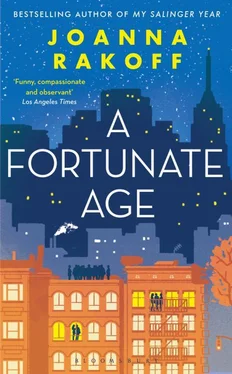A year later, Dave left his battered journal—an old black sketchbook—open on her desk and she peeked inside. “There’s something too pliant and languorous about her,” he explained, with the aid, Beth thought, of a thesaurus. “There’s something that bothers me about her. It’s as though she’s too vulnerable. Too soft. With those plump cheeks, like a kid. And yet, I wonder if this is what attracted me to her in the first place.” Reading his misgivings gave her a strange sense of relief. She’d been right all along—she wasn’t crazy. For some reason, after she and Dave became boyfriend and girlfriend—rather than simply friends —she had lost her ability to question him, to call him on his bullshit, to engage him in any sort of real discussion. She became increasingly afraid of him, she realized now, sipping her too-sweet coffee, or afraid of losing him. Why? And how had she never realized this before, in all the hours she’d spent dissecting their romance?
She placed a cigarette in her mouth, fumbling a bit with the pack (how did you get one out, they were packed in so tightly), lit it from the stove, and inhaled deeply. A pleasant little hum started up between her ears. She exhaled, giggling slightly. She hadn’t coughed, like a priss in a teen movie, like her friends would have expected. No, like Dave would have expected. He’d loved to see her as a bumbling, frail child. And she’d played into that, hadn’t she? She had, in a way, become that person—too soft, too vulnerable—so as not to disappoint him.
After the cigarette, the coffee, the cruller, Beth’s panic subsided and was replaced by a dull, faraway ache behind her eyes and a restless twitch in her fingers. When the phone rang, her heart leapt and she jumped up to answer it, then thought better of it and slumped down in her chair again. Her parents had returned from California the night before and it was most likely her mother, asking when they might expect her for a visit. She missed her mother and was looking forward to sitting down and talking to her—in theory. Just now, the gulf between them seemed too, too wide. How could she tell her about Will? About her lost job? Her wrecked finances? The mess she’d seemingly made of everything. The mere thought of going home increased the throbbing in her head: she couldn’t bear to picture the train, the quaint train station, the sloping lawns scattered now with rust-colored leaves, the ice cream shop in Scarsdale Village. The phone rang twice more and she heard her own voice—annoyingly breathy and a tad nasal—say, “Hi, this is Beth. I’m not home—” then ran into the next room and held her thumb to the volume button until she was left in a silence so welcome that she began, giddily, to laugh.
In December, Tuck lost his job at Boom Time . He was certain, Lil said, to find a similar job, and quick, at a similar magazine, like Fast Company or Bubble Economy , or Salon or Slate or Feed , or a portal like Yahoo! or Google, which was where the real money was, or even at an ad agency or branding firm or something.
“Could Tuck really do that?” asked Beth. It was difficult to imagine anyone she knew working in advertising, a soulless, ethically dodgy industry, which she’d taught her students in Milwaukee to dissect.
“Totally. The new companies operate on a different business model,” Lil told her, missing the point. They were shivering their way through bowls of crab bisque at the Grey Dog, with Sadie and Emily, on the first Saturday of the New Year. “They’re not looking for MBAs or whatever. They just want smart people who have new, exciting ideas.” Her friends nodded dutifully, their cheeks still reddened with cold. “I mean, I’m not excited that he was fired, but I guess, it’s like: if you’re going to be fired once in your life, this is probably the time.”
“You’re so right,” said Beth, leaning in toward Lil. “Will keeps wondering if he should go to a dot-com.”
“Would he do that?” asked Sadie, blotting her nose with an oversized handkerchief. “He seems so entrenched in the Journal .” Sadie’s mother disliked the Journal ’s politics—despite appearances, she was a staunch Democrat—and sniffed disapprovingly when she caught James Peregrine reading it.
Beth shrugged. “His friend Ben just got a job at this new site, Law.com, and he’s making like a zillion dollars.”
“What is it? A magazine?”
Again, Beth shrugged. “I’m not sure. They haven’t launched yet. Apparently, Ben has, like, nothing to do. He writes freelance pieces all day.” She blew, halfheartedly, on a spoonful of soup. “It’s just so weird. Jason tells us the most crazy stories about Stanford—”
“That’s where the guys who started Yahoo! are from, right?” interrupted Lil. “Weren’t they Stanford students?”
“Mmm-hmmm,” said Beth, “but Jason says there are so many start-ups that there aren’t enough people to staff them. So they’re recruiting freshmen. So, like, these eighteen-year-old guys are dropping out of school and making these huge salaries. Jason says they come back to campus for parties, and they’re, like, driving Maseratis.”
Emily gave a low laugh. “Can you imagine?” she said. “Weren’t we all, like, eating ramen when we were eighteen?”
“Beans and rice,” Lil corrected. “At Fairchild.”
“Oh, right,” said Emily, cocking her head to one side. “That’s now. That I’m eating ramen. I can’t afford beans and rice.”
“Me, either,” said Beth. She was still waiting to hear from Gail Bronfman—as well as the Gail Bronfmans of NYU, Hunter, Brooklyn College, and Baruch—about teaching in the spring semester, which was starting soon, so soon that she was sure nothing would come through and she would have to—well, she didn’t know. Work as an SAT tutor. Copyedit. Temp. Ask her parents for money. Or, as Will kept suggesting, write for magazines. She’d just, with an introduction from him, sent on a brief section of her dissertation, on the annual Dark Shadows conference in Pasadena, to an editor at Salon —and to her shock had received a brief, kind note saying they’d like to run it. She’d been debating the right time to tell her friends. If she mentioned it before the piece was thoroughly, truly, completely published, she worried she might jinx the whole affair, causing it to disappear into thin air. Now, with this bad news about Tuck, she thought she might not tell them at all. For she knew Lil. Lil would take it as an affront: Beth infringing on Tuck’s territory.
“Well, so are we,” said Lil. “I kind of love ramen, actually. Though it’s so bad for you.”
“Maybe Tuck’s next job will be better ,” suggested Emily.
A too-bright smile appeared on Lil’s face. “I was thinking the exact same thing! Salon would be great, wouldn’t it? He’s perfect for them.”
Her friends nodded. “Yes, definitely,” Beth agreed. No, she would say nothing about her piece. “I can’t believe they fired him right before Christmas. They could have waited until after the holidays, at least. It just seems so cruel.”
“I know! It was awful.” Lil had barely touched her soup. “Everyone else in the world was buying presents and, like, flying to the Bahamas, and we were afraid to buy coffee.”
“That sucks,” agreed Emily.
“I know,” cried Lil, pushing a heavy lock of hair behind her ear. “The worst thing, though, was that we were completely paralyzed, because all the magazines pretty much shut down between Thanksgiving and New Year’s. Nobody does any hiring.”
Читать дальше












